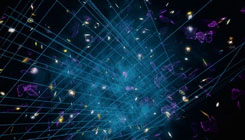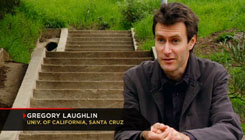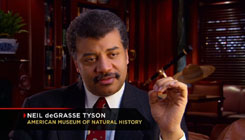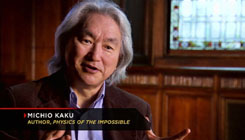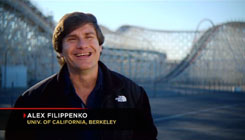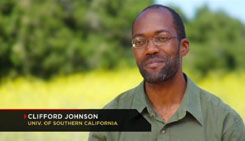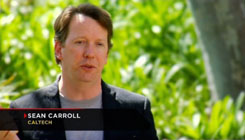Hang on for one of the most mind-bending and freaky rides
that "The Universe" series has to offer, as it covers the obvious
early on and then launches a very satisfying in-depth probe
into the bizarre environments of the far, far future....
The first segment contrasts various theories
concerning the end of our universe... although the sequencing
of information remains a bit clumsy.
(Laura Danly will later nail this so nicely in
the season 4 finale...)
Nonetheless, it isn't long before the ideas are crystal clear here
as well, and perhaps there are more of them this time around.
We get the "fiery" theory of the Big Crunch, with mention of the additional idea
that it may produce a cyclical life for the universe. We also get
the "icy" theory of the Big Freeze, with universal expansion slowing down,
but not enough that gravity can ever overpower it.
It is actually yet another theory that has the universal expansion
accelerating, to produce "The Big Rip", where smaller and smaller objects
cease to be able to hold themselves together. "The Big Rip" gets its
most detailed and convincing presentation in the series in this episode here.
However, the scientists don't quite seem to agree on which of these
three major theories is most likely.
The second segment goes over the first two laws of thermodynamics,
citing these as being fundamental supports for the Big Freeze theory.
We learn how these dynamics play out within the life cycle of a star,
and how each future generation of stars will be affected over long,
long periods of time. What will the universe be like, after most
of the fires have gone out for good?
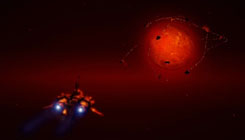
The third segment really kickstarts the journey that is
unique to this episode - an in-depth look at far future time.
We begin with a review of essentially the same cosmic calendar
as was made famous in
Carl Sagan's Cosmos series, which compresses
all time from the big bang until now into one year. Alex Filippenko
then flips over into the next "year", to project how long the Earth
and its solar system will last.
Greg Laughlin then explains why scientists needed an even
bigger logarithmic scale to express the amount of time required
for the details of the Big Freeze and Big Rip theories. Their answer?
"Cosmological Decades", with each decade being ten times longer
than all the time that had passed before it began. This is
quite a mind-warping concept, made somewhat easier by the crude
analogy of the staircase that Laughlin is seen to climb in the episode.
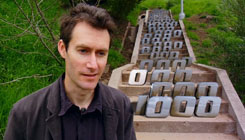
Our own cosmological decade, the tenth, has all the familiar
bright stars, and planets that can lead to life. Laughlin proceeds
upwards to the 20th and 30th decades, where the dead star
universe of "The Degenerate Era" is described in great detail.
And that just brings us to the end of the third segment of the episode.
The two final segments
continue the ever-lengthening logarithmic climb into the future...
Ideas explored include:
The Black Hole Era ( approximate Cosmological Decade: 60 )
- protons won't exist therefore humans don't exist.
- strange life.
- speed of thought incredibly slow
The Dark Era ( approximate Cosmological Decade: 100 )
- Where (When) Angels Fear to Tread
- Everything (Atoms, black holes) has crumbled
The Quantum Possibility
- How bubbles of alternate physics are likely to arise
- Can life escape to continue in another universe?
|
Participants include:
|
from the disc sleeve:
Cosmic Apocalypse:
Whether it's a blazing cosmic fireball or a paralyzing galactic ice age,
the universe as we know it
will one day end, taking with it
space, matter and even time.
Peer into the crystal ball of the future as the harsh and hostile realities
of the world we live in are revealed.

|
Chapter List:
- Introduction
- Fire and Ice
- When the Lights Go Out
- Dying Embers
- Angels Fear to Tread
- Bubble of Hope
|
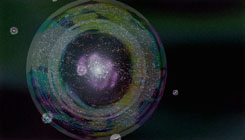
|
|

